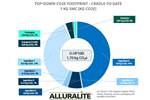ACMA sustainability event educates on composites LCA, recycling
Recent conference in Denver, Colorado, emphasized the tools and knowledge composites manufacturers will need to meet customer and government sustainability goals.

Source | CW
The American Composites Manufacturers Association (ACMA, Arlington, Va., U.S.) hosted its first Composites Sustainability Today (CST) event June 4-6, 2024 in Denver, Colorado.
Aimed at educating ACMA members about the realities of sustainability in manufacturing, the event featured speakers that dove deep into the whys and hows of life cycle assessment (LCA) and environmental product declarations (EPD), the current and projected legislative landscape — including an introduction to tax incentives and government grants available for manufacturers seeking to evaluate or improve sustainability, legislation aimed at requiring greenhouse gas emissions disclosures and more — and real-world examples of incorporating recycling methods for manufacturing scrap and/or recycled material into operations.
“Why focus on sustainability?” asked Cindy Squires, CEO of ACMA, during the event. She explained that beyond goodwill for the environment, there are also practical business reasons for evaluating and improving a company’s environmental impacts, such as OEM demand, proposed mandates and keeping apace with the initiatives put forth by other industries and other countries. “Our vision is to make composites the sustainable material of preference,” said Squires. “We want to help you show the sustainability story of advanced composites.”
One sustainability emphasis of ACMA is the creation of an LCA and EPD Calculator, set to launch by the end of this year. The tool, developed in collaboration with a consulting partner, will draw upon pre-verified environmental impact data for a range of materials used by composites manufacturers — particularly, at the calculator’s outset, those involved in building and construction. ACMA members will be able to work with ACMA and the calculator to generate an LCA or EPD for their products, in what ACMA says will be a simpler and more cost-effective process than many available.
“Quantifying environmental impacts, presenting that data and obtaining accurate primary data from suppliers, that’s what we need in the composites industry,” said John Schweitzer, VP of EH&S and sustainability at ACMA.
The event also included tours of nearby carbon fiber recycler Vartega (Denver) and one of the campuses of the National Renewable Energy Laboratory (NREL), which included an introduction to NREL’s work in designing wind turbine blades for recyclability, studies of wind blade recycling methods, and its environmental impacts and research into recyclable, bio-based epoxy.
“Sustainability is part of all of it — materials, manufacturing, use, end of life,” explained Derek Berry, senior wind technology engineer at NREL.
For more information, see ACMA’s sustainability overview page.
Related Content
-
DITF Denkendorf advances sustainable carbon fibers, oxide fibers for CMC and more
The German Institutes of Textile and Fiber Research are targeting more sustainable carbon fiber via low-pressure stabilization and bio-based precursors, and working with Saint-Gobain to commercialize oxide ceramic fibers for CMC.
-
JEC World 2024 highlights: Glass fiber recycling, biocomposites and more
CW technical editor Hannah Mason discusses trends seen at this year’s JEC World trade show, including sustainability-focused technologies and commitments, the Paris Olympics amongst other topics.
-
Solvay carbon footprint tool accelerates GHG reduction efforts
The digital tool will enable Solvay to quickly and accurately calculate the carbon footprints of its products and take action to reduce them, beginning with its Novecare sites and extending to other business areas.

.jpg;width=70;height=70;mode=crop)






.jpg)








